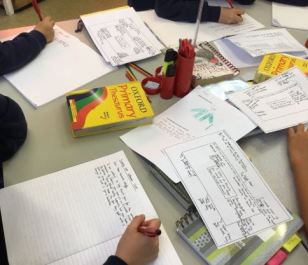The piece below was written many years ago by a Year 9 pupil, Kanika, for a colleague of mine (@craigbmorrison) at Parkside Community College, Cambridge. It illustrates, I think, some features of what might be termed ‘exploratory’ writing – developing response, understanding and expression without recourse to P.E.E or P.E.T.A.L. or other formulae, and without adherence to the conventions of an ‘analytical paragraph’, of ‘academic style’, or of an exam ‘answer’. Emerging from talk, it maintains, throughout, a sense of dialogue – between the pupil and herself, and between the pupil and the text.
Re-thinking ‘success criteria’: a simple device to support pupils’ writing

Colleagues and I have been working with primary schools to develop an alternative to listed ‘success criteria’ for writing, which we call ‘boxed’ or ‘expanding success criteria’ (or often just ‘the rectangles thing.’) It is very easy to adopt, and teachers have been finding that it can transform how writing is talked about and approached in the classroom, with an immediate impact on the quality of what pupils are producing. (That is something which we now need to research properly!)
Continue reading “Re-thinking ‘success criteria’: a simple device to support pupils’ writing”
‘In this school, English is about…’
Practical tools for reflecting on the what, why and how of English teaching
 A friend’s nephew, when in Year 8, remarked to him: “I used to enjoy English, but all we do now is write PEE paragraphs.” If this is a pupil’s view (even an unfair one) of English in their school, then something has gone badly wrong. It’s extreme, but it is – I think – indicative of a trend in secondary English, in which the narrow imperatives of external assessment are dominating planning and thinking, and when GCSE ‘AOs’ are busily colonising Key Stage 3. Meanwhile, tests and secure-fit assessment frameworks are increasingly dominating primary teachers’ thinking about the teaching of reading and writing.
A friend’s nephew, when in Year 8, remarked to him: “I used to enjoy English, but all we do now is write PEE paragraphs.” If this is a pupil’s view (even an unfair one) of English in their school, then something has gone badly wrong. It’s extreme, but it is – I think – indicative of a trend in secondary English, in which the narrow imperatives of external assessment are dominating planning and thinking, and when GCSE ‘AOs’ are busily colonising Key Stage 3. Meanwhile, tests and secure-fit assessment frameworks are increasingly dominating primary teachers’ thinking about the teaching of reading and writing.
In this post, I offer two simple tools which I have used with both primary and secondary teachers for reflecting on the principles behind English as a subject. This might be as part of a process of curriculum renewal, of the revitalising of practice, or of a deliberate attempt to build cohesion and shared purpose. Or it might just be to to stimulate professional discussion about some basics – on what they are doing, how they are doing it, and why.
